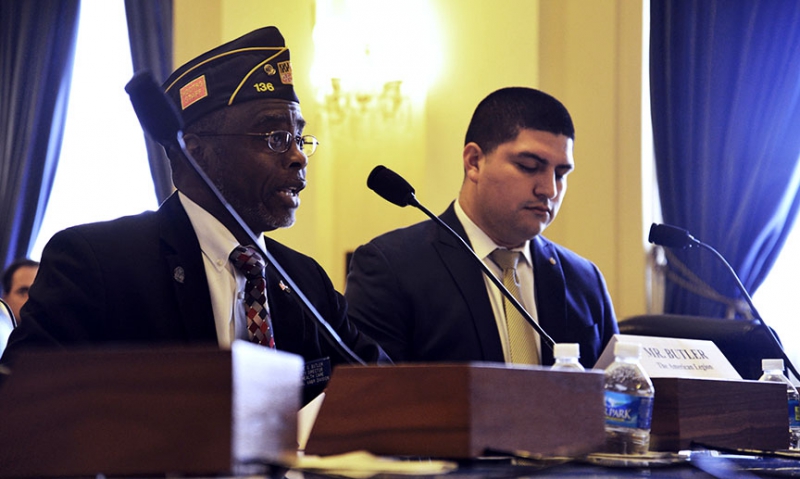
Legion's Roscoe Butler testifies at congressional hearing examining billing and reimbursement for care in the community.
The American Legion testified at a Feb. 11 congressional hearing examining billing and reimbursement for care in the community under the Department of Veterans Affairs’ plan to consolidate non-VA care programs. Roscoe Butler, assistant director of Health for the Legion’s Veterans Affairs & Rehabilitation Division, presented the testimony before the House Committee on Veterans’ Affairs Subcommittee on Health.
Dating back to 1945, VA's purchased care program afforded World War II veterans and other veterans with service-connected ailments opportunities to seek "hometown" medical and dental care at government expense. Under the Hometown Program, eligible veterans could be treated in their community by a doctor or dentist of their choice.
To date, the VA has implemented a number of programs to manage veterans’ health care when such care is not available in a VA health-care facility, could not be provided in a timely manner or is more cost effective. Programs such as Fee-Basis, Project Access Received Closer to Home (ARCH), Patient-Centered Community Care (PC3), and the Veterans Choice Program (VCP) were enacted by Congress to ensure eligible veterans could be referred outside the VA for needed health-care services.
After learning that VA facilities were falsifying appointment logs to disguise delays in patient care in 2014 Congress created the VCP.
“However, it quickly became apparent that layering yet another program on top of the numerous existing non-VA care programs – each with their own unique set of requirements – resulted in a complex and confusing landscape for veterans and community providers, as well as the VA employees that serve and support them,” said Butler.
On Oct. 30, 2015, VA presented its Plan to Consolidate Community Care Programs – a vision outlining improvements for how VA will deliver health care to veterans in the future. The plan seeks to consolidate and streamline existing community care programs into an integrated care delivery system, enhancing the way VA partners with other federal health-care providers, academic affiliates and community providers. It promises to simplify community care and gives more veterans access to the best care anywhere through a high performing network that keeps veterans at the center of care.
While addressing committee members, Butler outlined current systems in place, noting The American Legion’s support to consolidate VA’s multiple purchased-care programs into one new VCP that is seamless, transparent, and beneficial to enrolled veterans.
“We believe it has the potential to improve and expand veterans’ access to health care,” Butler noted.
The plan’s overall success will be directly attributed to how VA will work with its employees, Congress, veteran service organizations, private providers and other stakeholders as they move forward in developing and implementing the plan.
Additionally, efforts eliminating operational inefficiencies, including standardized billing and reimbursement, will make it easier and more appealing for community health care providers to partner with VA. The American Legion strongly believes VA must standardize its reimbursement rates but not set the rates too low, discouraging community partners from signing up as a participating provider in the new VCP.
“We are pleased to see that VA proposes to implement a claims solution able to auto-adjudicate a high percentage of claims, enabling VA to pay community health care providers promptly and correctly, and move to a standardized regional fee schedule,” Butler said. “However, we do not believe Congress should continue to provide VA an open check book without any assurance from VA that their plan will work. Much as further funding for the Joint Electronic Record is contingent on proving benchmarks are met, Congress can and should require progress benchmarks here.”
VA has identified a number of necessary legislative items that require action by Congress this year to best serve veterans going forward. The American Legion supports many of these, such as measured budget flexibility, the Purchased Health Care Streamlining and Modernization Act, flexibility for the federal work period requirement, and special pay authority to help VA recruit and retain the best talent possible to lead their hospitals and health-care networks.
Butler concluded his testimony by echoing the sentiments of Rep. Mark Takano earlier in the hearing, affirming a commitment to revitalize VA programs and ensure a robust health-care system.
“The American Legion believes that together we can accomplish these legislative changes before the end of this session of Congress,” Butler said. “We can’t let another year slip away. Our veterans deserve the same sense of urgency now that Congress has shown numerous times since the VA scandal first erupted in 2014.”
- Veterans Healthcare

